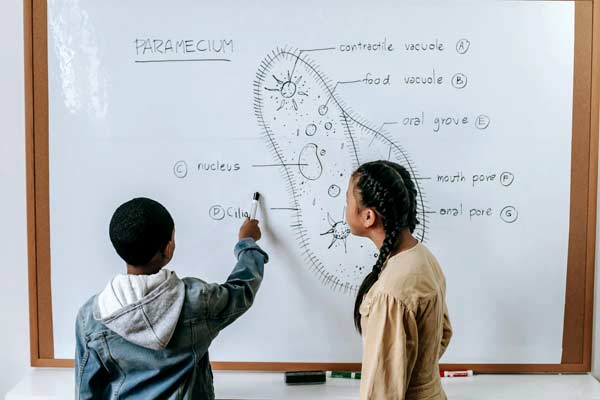What Is Gcse Equivalent in USA? Understanding the Differences
The General Certificate of Secondary Education (GCSE) is an academic qualification awarded in a specific subject, typically taken by students in the United Kingdom (U.K.) at the age of 15 or 16.
The GCSE is a crucial milestone in the U.K. education system, as it is often used as a benchmark for entry into further education or employment.
However, for those who need to become more familiar with the U.K. education system, it can be challenging to understand what the GCSE is equivalent to in the United States (U.S.).
The U.S. education system generally does not have an equivalent to the GCSE. It is structured differently from the U.K. system, with different levels of education and qualifications.
For example, in the U.S., students typically attend elementary school for six years, followed by two years of middle school and four years of high school.
High school students can take courses and exams, including Advanced Placement (A.P.), SAT, and ACT. These exams assess students’ readiness for college and are often required for admission to U.S. universities.
Despite the differences between the two education systems, some rough equivalencies exist between the GCSE and U.S. qualifications.
For example, the GCSE is equivalent to the high school diploma in the U.S., which is awarded to students upon completion of their high school education.
Additionally, some U.S. universities may require applicants to have completed certain levels of coursework or achieved certain grades in specific subjects, similar to the GCSE.
Understanding GCSE
Origins and Purpose
The General Certificate of Secondary Education (GCSE) is a qualification awarded to students in England, Wales, and Northern Ireland, typically at 16.
It was introduced in 1988 as a replacement for the Certificate of Secondary Education (CSE) and the O-Level qualifications.
🌟 Hey Students! 🚀 Ready for the ultimate experience? Join us on Studentsinside.com's Facebook, YouTube, WhatsApp, and LinkedIn. Click now for tips, fun, and success vibes! 🌈✨ #StudentLife #JoinUs
The purpose of GCSE is to provide students with a foundation for further education or employment. It is also used as a measure of school performance.
Structure and Subjects
GCSE typically takes over two years in secondary school, also known as Key Stage 4. Students are required to take a minimum of five GCSEs, including English and Mathematics.
They can choose from various subjects, including science, languages, geography, history, literature, music, physics, chemistry, biology, French, German, and business studies.
Grading System
The GCSE grading system, introduced in 2017, ranges from 9 to 1, replacing the old A* to G system, with nine as the highest attainable grade.
This system is designed to more accurately reflect students’ varying abilities. A grade 4 denotes a standard pass, a grade 5 is a strong pass, and an exceptional grade 9 is reserved for top-performing students.
The table below shows the GCSE grades and their equivalent letter grades:
| GCSE Grade | Letter Grade |
|---|---|
| 9 | A* |
| 8 | A |
| 7 | A |
| 6 | B |
| 5 | C |
| 4 | C |
| 3 | D |
| 2 | E |
| 1 | F |
U.S. Education System
Schooling Structure
The U.S. education system is divided into several stages, beginning with preschool and ending with a high school diploma. Children typically start preschool at 3 or 4, followed by primary or elementary school, which lasts six years from grades 1 to 6.
After that, students attend junior high or middle school for two years, covering grades 7 and 8, and sometimes grade 6 is included in this grouping.
Following junior high, students attend senior high school, which lasts four years and covers grades 9 to 12. Students take various courses in high school, including English, math, science, social studies, and electives.
At the end of high school, students receive a high school diploma, a requirement for admission to most colleges and universities in the U.S.
Standardized Tests
Standardized tests are an essential part of the U.S. education system. The most widely known standardized tests are the SAT and ACT, which are college admission exams that assess a student’s readiness for college-level work.
The SAT exam is typically taken by students in their junior or senior year of high school, and it consists of sections on reading, writing, language, and math. The ACT exam covers English, math, reading, and science; high school students also take it in their junior or senior year.
In addition to the SAT and ACT, other standardized tests assess a student’s proficiency in specific subjects. These include SAT Subject Tests, exams in particular subjects such as biology, chemistry, and physics, and Advanced Placement (A.P.) exams, which are college-level exams that students can take in high school to earn college credit.
What Are GCSE Equivalents in the U.S.?
In the U.S., the closest equivalents to the GCSE are a high school diploma or a GED credential. Other options include Advanced Placement (AP) courses, SAT and ACT scores, and International Baccalaureate (IB) programs. These demonstrate academic proficiency for secondary education in the U.S.
GED
The GED, or General Educational Development, is a credential that verifies the attainment of high school-level academic skills. Also called a General Education Diploma, the GED comprises four subject tests: language arts, math, social studies, and science. Originating in the 1940s, the American Council on Education introduced the GED to assist veterans who entered the military without completing high school.
High School Diploma
In the U.S., a High School Diploma is comparable to a GCSE (grades A*-C / 9-4). To obtain a High School Diploma, students must complete four years of high school and earn a minimum of credits.
To earn a High School Diploma, students must meet specific criteria, which differ by state. Generally, they need to earn credits in English, math, science, social studies, and elective courses.
SAT and ACT
The SAT and ACT are college entrance exams taken by high school students in U.S. Universities. They assess a student’s readiness for college-level work.
While the SAT and ACT are not directly comparable to GCSEs, they can indicate a student’s academic ability. The SAT and ACT cover a range of subjects, including math, reading, and writing.
Advanced Placement
Advanced Placement (A.P.) courses and exams are available to high school students in the U.S., providing an opportunity to take college-level classes while still in high school.
A.P. exams, taken after completing the course, are scored between 1 and 5, with scores of 3 or above deemed as passing. These exams encompass various subjects such as math, science, English, and social studies.
Although A.P. exams are not equivalent to GCSEs, they indicate a student’s academic capabilities and readiness for college.
Other International Equivalents
International Baccalaureate
The International Baccalaureate (I.B.) is a renowned global program that provides a rigorous and inclusive curriculum for students aged 16-19. It seeks to cultivate informed, compassionate, and receptive individuals.
The I.B. encompasses four programs: the Primary Years Program (PYP), Middle Years Program (MYP), Diploma Program (D.P.), and Career-related Program (C.P.).
In the U.S., the I.B. Diploma is viewed as equivalent to a high school diploma and is acknowledged by higher education institutions. Completing the I.B. Diploma can qualify students for college credits or allow them to enroll in advanced courses.
Cambridge IGCSE
The International General Certificate of Secondary Education (IGCSE) is a globally recognized program that provides students with a broad and balanced curriculum.
The program is designed for students aged 14-16 and offers over 70 subjects, including languages, humanities, sciences, and mathematics.
Cambridge IGCSE is recognized by colleges and universities in the United States and worldwide. Students who complete the program may be eligible for college credits or advanced placement in college courses.







